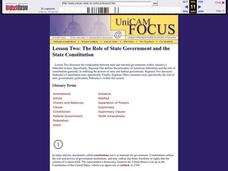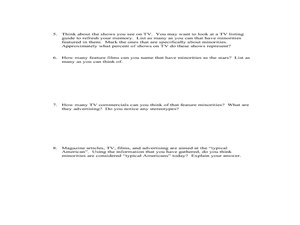Curated OER
The Federalist Debates: Balancing Power Between State and Federal Governments
Students examine the pros and cons of state sovereignty vs. federalism, as argued by the Founding Fathers. They identify the basic positions of each side, complete a worksheet, and write a persuasive essay arguing for Jefferson or Hamilton.
Curated OER
Rights and the Wyandotte Constitution
Every state uses a set of rights to establish laws and regulations. Explore the Wyandotte Constitution as it was written in 1859 and compare it with how rights in Kansas have changed, especially those that pertain to gender and race. A...
US National Archives
Documented Rights Educational Lesson Plan
How have groups struggled to have their unalienable rights recognized in the United States? Acting as a research team for the Human Rights Council of the United Nations, your young historians will break into groups to research how people...
National Park Service
Civil War to Civil Rights: From Pea Ridge to Central High
Explore how the Civil War impacted the Civil Rights Movement. Class members complete a series of projects for a unit that uses a layered curriculum approach to learning.
Curated OER
A Lesson To Accompany "The First Bank of the United States: A Chapter in the History of Central Banking"
Here is an interesting topic. Learners examine the economics that led to the founding of the First Bank of America. They participate in a reader's theater experience depicting the debate between Alexander Hamilton and Thomas Jefferson...
Curated OER
The Movement Before the Movement: Civil Rights Activism in the 1940s
Many educators focus on the civil rights movement as it occurred after Rosa Parks incited the bus boycott. Extend the understanding of the fight for civil rights in the United States with this post-WWII lesson. Learners examine and...
Curated OER
The Role of State Government and the State Constitution
Students investigate the relationship between state and national governments. They define the principles of American federalism how the constitution outlines the powers of state and federal government. Lesson focuses on Nebraska...
Curated OER
The Civil Rights Movement, Phase II: 1960 - 1990
High schoolers explain the impact of events leading up to the development of federal civil rights. They identify methods used to expand the right to participate in the democratic process and evaluate how governments achieve their stated...
Curated OER
Development of Federal Civil Rights Acts : 1950's - Present
Students use the Internet to research one of five cases associated with Brown v. Board of Education and then join a group with people who researched the other four.
Curated OER
Federal Holidays
Third graders complete various activities pertaining to Martin Luther King Jr. Day, Presidents' Day, Memorial Day, Labor Day, Columbus Day, and Veteran's Day. They conduct research and complete writing and art activities on the...
Curated OER
Bill of Right in Action
Groups reserach and write about topics given to them by their teacher dealing with the Bill of Rights.
National Endowment for the Humanities
Lesson 4 James Madison: Internal Improvements Balancing Act—Federal/State and Executive/Legislative
Who has the power? The founding fathers asked the same question when the United States was formed. Learners explore issues that arose during Madison’s presidency that raised constitutional questions. Through discovery, discussion, and...
Ohio Center For Law-Related Education
Four Activities: Thurgood Marshall and the Nomination and Confirmation of Federal Judges
The process of nominating and confirming federal judges can sound like a lot of bureaucratic hoops, but a resource breaks down the steps of the Supreme Court nominations in a simpler manner. Learners participate in four activities that...
Constitutional Rights Foundation
Arizona v. United States — States and Immigration Law
As part of a study of immigration law, class members read a summary of the Supreme Court case, Arizona v. United States. They then examine a series of examples and acting as federal court judges, must determine if the scenarios meet the...
Curated OER
The Right to Remain Resilient
Learners examine the Civil Rights Movements in the U.S., both current and historic. In small groups students investigate a specific civil rights group, create an illustrated timeline, noting key events, people, and state and federal laws.
Curated OER
Budget Debate: How Would You Balance the Federal Budget?
Students examine how to balance the federal budget. In this American economics lesson, students read the provided article "Congress Debates Cutting the Budget." Students then collaborate in small groups to determine how to balance the...
Curated OER
Redistricting: Drawing the Lines
Difficult redistricting concepts are covered in a context that will make it understandable to your government scholars. They begin with a KWL on the term redistricting and then watch a video to answer some questions. They analyze...
Curated OER
America 2000: Federal Round Table Discussion
Eighth graders examine the United States Constitution and identify the beliefs and values Americans follow today. In groups, they compare and contrast state's rights and federal rights and the issues affecting them. They debate the...
Curated OER
Defending the Homeland--The Alien and Sedition Acts of 1789
Students explore that there have been times during the history of the US when ,in response to real and perceived threats, both domestic and foreign, our country has responded by passing legislation. Students trace the fundamental rights...
Curated OER
The Kansas-Nebraska Act of 1854: Popular Sovereignty and the Political Polarization over Slavery
Why did Stephen Douglas support the Kansas-Nebraska Act of 1854? Why did Abraham Lincoln oppose it? Young historians examine how the Kansas-Nebraska Act of 1854 affected the political balance between free and slave states and explore how...
Curated OER
Minorities in Mainstream American Society
So many people fought for Civil Rights in the United States. Read about the Civil Rights Act of 1964, and discuss what the act guarantees. Then pass out a slew of magazines and encourage them to observe how often minorities appear in...
Curated OER
The Right to Education for California's Minorities and Immigrants
Students examine the elements of various court cases and how state and federal laws affect them. They participate in a series of mock trials to gain a better understanding of the issues involved.
Curated OER
The Right to Education for California's Minorities and Immigrants Offline Lesson Plan
Learners examine the elements of various court cases and how state and federal laws affect them. They participate in mock trials.
Bill of Rights Institute
Celebrate Constitution Day
September 17 is a great day to focus on the US Constitution for on this day in 1787, the Constitution was signed. Through a series of activities, high schoolers get a chance to look closely at this famous document and the rights and...

























